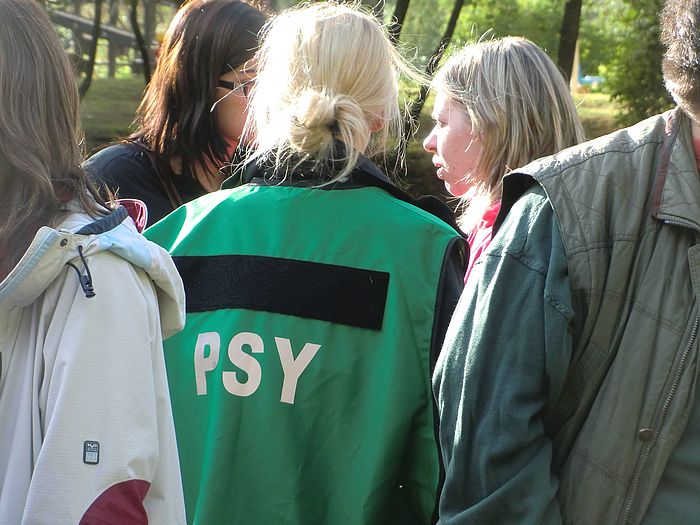
New EU-funded Project − Psycho-social Support in Crisis Situations

In addition to physical injury and loss of life, these events can inflict massive psychological stress and traumatize survivors and rescue teams alike. A new EU-funded collaborative project, entitled Psycho-social Support in Crisis Management (abbreviated PsyCris), will attempt to define how to select and provide the sort of psycho-social support that is best suited to different types of situation, and will investigate the impacts of stress and other constraints on crisis managers and their decision-making processes.
Munich – "Our goal is to make emergency planning and service infrastructure in Europe as a whole more efficient, to identify more effective psycho-social support measures for those impacted by crisis situations, and to enhance cross-border cooperation during and after crises. The international dimension is crucial, because disasters are no respecters of national borders," says LMU’s Dr. Christine Adler, coordinator of the project. The researchers involved plan to analyze previously published studies relevant to the major issues with a view to identifying psycho-social interventions and also prevention that lead to optimal therapeutic outcomes in cases of posttraumatic disorders. "Crisis management implies operating under conditions of extreme stress resulting for instance from multiple tasking, rapid decision making or working under risk and time pressure. Effective strategies to cope with stress are thus crucial for persons working in this field. In our project a stress management training will be developed based on state-of-the-art knowledge of labor psychology and psychotherapy," summarizes Professor Stefan Duschek, scientific project coordinator (University of Health Sciences UMIT; Austria).
The studies will evaluate responses to previous crises, such as the school shootings in Erfurt, to distinguish between measures that were more and less effective. Based on the results of these analyses, the researchers will formulate a set of best-practice proposals, which will enable crisis managers to select the appropriate model for the provision of psycho-social care in any given situation.
Pan-European Online Platform
These response modules will be accessible throughout Europe on an online platform. "On the one hand, response coordinators – crisis management units or political staffs – can choose scenarios from this set of strategies and practice their implementation; on the other, they will have immediate access to effective methods of crisis management," says Adler. Since administrative structures and distribution of responsibility for emergency services vary considerably within Europe, the design of the platform will take these differences into account.
The project will explore both immediate measures and later intervention strategies to help victims cope with traumatic stress and find their feet in everyday life once again. "This two-pronged approach is important because the impact of psychological stress often becomes manifest only after some delay," says Adler.
Funds for PsyCris are being provided by the EU (3.8 million euros for 3 years), and the collaborative project will be carried out by 11 institutional partners located in Germany, Austria, Spain, Israel, Luxembourg and Lithuania, including the Bavarian Research Alliance (BayFOR). BayFOR has advised the international consortium in the application phase and supports the coordinator during the entire duration in the administrative project management.
Bavarian Research Alliance GmbH
The Bavarian Research Alliance GmbH (www.bayfor.org) is an association whose purpose is to promote Bavaria as a centre for science and innovation within the European Research Area. It supports and advises scientists from Bavaria and stakeholders from the private sector in the competition for European research funds. The focus is directed at the current EU Framework Programme (FP7) and the forthcoming Framework Programme for Research and Innovation "Horizon 2020". To achieve this, BayFOR provides subject-specific information and offers strategic advice and active support for initiating projects, setting up international research consortia and submitting applications during the contract negotiations with the European Commission and for project management. As a partner in the network for SMEs "Enterprise Europe Network" (EEN), BayFOR provides specific advice for SMEs which are interested in EU research projects. BayFOR also coordinates the joint activities of the Bavarian Research Associations and supports their networking efforts on a European level. The Scientific Coordination Office Bavaria-Québec/Alberta/International within BayFOR provides support for bilateral and multilateral research projects from these regions. BayFOR is a partner institution in the Bavarian "Haus der Forschung" (www.hausderforschung.bayern.de/en). For further information, see the PsyCris website http://www.psy.lmu.de/psycris-en/.
Press Contact
Prof. Dr. Frauke Liers (coordinator)
Friedrich-Alexander-University Erlangen-Nürnberg
Phone: +49 (0)9131 85-67151
E-mail: frauke.liers@math.uni-erlangen.de
Contact at BayFOR
Dipl.-Ing Robert Iberl
Scientific Officer
Information and communication technologies
Bavarian Research Alliance GmbH
Phone: +49 89 9901888-131
E-Mail: iberl@bayfor.org
Emmanuelle Rouard
Head of Public Relations
Bavarian Research Alliance GmbH
Phone: +49 (0)89 9901888-111
E-mail: rouard@bayfor.org
(Copy requested in case of publication: Bavarian Research Alliance, Prinzregentenstr. 52, 80538 Munich, Germany)




